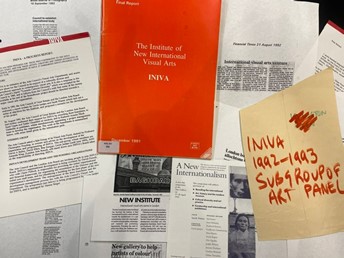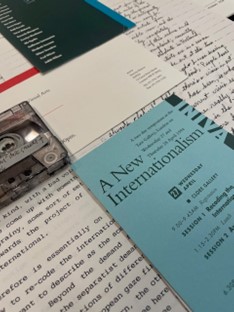Approaching its 30-year anniversary, iniva (the Institute of International Visual Arts) was last year the recipient of an Archives Revealed grant, which has enabled the cataloguing of four key collections from their institutional archive. iniva is an evolving visual arts organisation dedicated to nurturing and disseminating radical and emergent contemporary artistic practice centring Global Majority, African, Asian, & Caribbean diaspora perspectives. The Stuart Hall Library acts as a critical and creative hub for their work; it houses a unique and rare collection of over 10,000 books, catalogues and periodicals alongside iniva’s institutional archive that preserves and promotes the knowledge of the practice of these artists.
The Archives Revealed project allowed iniva to recruit a Cataloguing Archivist, Niamh Glanville-Frayne, who has spent the last year cataloguing four of the most frequently requested archival collections:
- the Veil touring exhibition
- iniva’s Governance and Early Constitution files
- our Founding Symposium ‘a New Internationalism’
- and X-Space.

Archive material from INGOV, iniva’s Governance and Early Constitution Collection, 2023; image courtesy of iniva
These four collections will shortly be the first to be launched on the brand-new archive catalogue, accessible via their website from November 2023.
The feat of creating an archive catalogue from scratch has been challenging, but has provided iniva and their archivists with agency over how they represent their collections and the people connected to them, and the space to embed care into the structure of the archive catalogue.
Like many other archives, iniva is indebted to its committed volunteers who have supported the development of the archive. For the project, three volunteers were recruited who have contributed to the project with a range of tasks including repacking, supporting with collections care and helping to create research guides to accompany the catalogued collections.
One significant task in building a catalogue is creating authority files, which volunteers have contributed to significantly. Authority files, or name files, define the subjects connected to the collections, whether they be individuals or organisations. Through this project Niamh, alongside the volunteers and iniva’s existing Archivist & Engagement Producer Kaitlene Koranteng, have crafted an approach to authority files which defines individuals and organisations beyond their relationship with the institution. Many of iniva’s authority files are those of artists, so they were careful to respect how people’s artistic practices have changed and evolved over time. Beyond the people directly connected to the collections, iniva have also been thinking of their wide range of users and how they will engage with the new catalogue.
“We are aware that our audiences may not engage with archives regularly or at all, and we have tried to use accessible language throughout the catalogue and define any archive terms that exist throughout.”
Niamh Glanville-Frayne
iniva’s Archives Revealed project has also allowed a critical time for reflection on their positionality as an institution that champions radical, non-Western and decolonial artistic practices, and how to factor this into the methodologies they use for cataloguing work. Furthermore, in acknowledging the limitation of their institutional lens in the way in which materials have been collected and contextualised, Niamh felt it important to rebalance the narrative by reaching out to various individuals connected to the collections, interviewing them about their recollections of the collections.

Archive material from INPROV/EVE/SYM, iniva’s Founding Symposium ‘A New Internationalism’ collection, 2023; image courtesy of iniva.
We are lucky to have a living archive, so for the Veil exhibition collection, Niamh spoke with three of the curators, David A. Bailey, Jananne Al-Ani, and Zineb Sedira. Each of these accounts provided us with invaluable context that extended beyond the contents within our archive, and we began to embed these conversations within the catalogue entries, accounting for accompanying perspectives on the collections and the stories they tell.
In an effort to showcase their newly catalogued collections, Niamh facilitated a series of ‘show and tell’ talks. These talks were free and open to the public, and invited participants to view a selected display of records from each collection, contextualised by Niamh, and to take part in open discussions about the collections and their historical and socio-political context.
The project will end in November 2023, with the new catalogue being launched and made accessible via their website, iniva.org. They hope it will offer an accessible entry point for wide audiences, contribute to wide-ranging research and academic knowledge, expose hidden art histories and demonstrate the pioneering and activist work of iniva to inspire a younger generation of artists and creatives.
